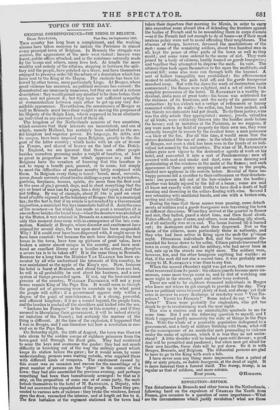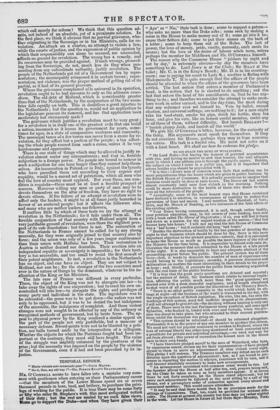REVOLUTION—REFORM.
THE disturbanCes in Brussels and other towns in the Netherlands, following hard on the expulsion of CHARLES the Tenth from France, give occasion to a question of some importance—What are the circumstances which justify revolution? what are those burdensome and oppressive. with a faint heart. We shall see how he redeems his pledge. There is one state of things which may be allowed to justify re TO HIS GRACE THE DUKE OF WELLINGTON.
selves. An insurrection in Polan, or in Italy, against the tyrants others besides you should be acquainted with it. . devote themselves on the altar of freedom, they have no right to over all the interests of the people.
It matters little by which of these tests we try the attempt at " Your Grace having commenced, it is said, though rather tardily, revolution in the Netherlands ; for it fails under them all. The your political education, may, in the course of your reading, have met forcible conjunction of that country with Holland might form a with a book called The Mirror of Magistrates ; if so, you will find it there veryjustifiable ground of revolution, were there the slightest pros- laid down as a maxim for the unpaid wisdom of the nation= that bad pect of its safe clissolution: but there is not. The restoration of houses keep late hours.' I will not say that the late House of Commons the Netherlands to France cannot be called for by any strong " Besides the destruction of health by the bad practice of devoting the necessity, for they were originally joined to that country also by night to that business which should be done by day, there is this more force; and the union was only of a few years longer continuance important objection to the present practice—namely, that it is calculated than their union with Holland has been. Their restoration to to make the House as much as possible the mere registry of the will of Austria is neither desired nor desirable. Their erection into an the Minister for the time being. It is impossible to discuss with calm de- independent republic or sovereignty is impossible ; for their tern- liberation the measures that are submitted to the House at a late period of the night. It is also impossible to have any adequate abstract of the tory is too accessible, and too small to resist the first assault of proceedings appear before the public. The present system has all these their potent neighbours. In fact, a revolution in the Netherlands vices—first, it tends to diminish the number of men of experience who has no object, and can have no object. They are not subject to would belong to the Legislature ; secondly, it prevents discussion and Holland, nor can be ; for the stronger of the two countries must deliberation on matters the most interesting in their details to the people ever in the nature of things be the dominant, whatever be the in- at large ; and, thirdly, it prevents the public from becoming acquainted clination of the King or his Ministers. "It is true that the great party questions are debated and reported; The late case of France was different in every particular. but the matters of detail, the business which relates to internal regula- There, the object of the King was not to abrogate one law—to tion, affecting the public much more than the ' great questions, are take away the rights of one corporation • but to erect his own un- slurred over with a most shameful negligence, and at length abandoned controlled will into law—to abrogate the rights and privileges of to that worst of all possible guides the discretion of the Treasury Bench. "There is no other public assembly in the world which holds its sit- every party and individual in the state. The legislature was to tings at night—all the business of the world is transacted in the day, with be subverted—the press was to be put down—the nation was not the single exception of British legislation. He who, like me, has seen the only to be oppressed, but it was to be denied the last indulgence workings of this system, must feel ineffable disgust at its abominations. of the miserable, the indulgence of complaint. And these violent I will not attempt to give details—the deciding without hearing is only one changes were not sought to be effected by any of the ordinary or of them. There were in the last Parliament many youthful, and some aged recognized methods of government, but by brute force. The ap- Sybarites, who flocked in, loaded with wine and victuals, when the divi- sion was about to take place, but who attended to their sensual gratifica- peal to physical power by the King. rendered a similar appeal on tions whilst the discussion was goinc•b on. the part of the people not only Justifiable; but a measure of "This system should be reformed—it should be reformed altogether. necessary defence. Sword-points were not to be blunted by a peti- Fortunately it is in the power of any one member to produce this reform. tion, nor balls turned aside by the interposition of a syllogism. We need not wait for popular sentiment to awaken in England, where the love of rational liberty has either long slumbered or been converted into Whether the objects for which the Parisians fought had been im- , portant or the contrary, they must still have fought. The value a prostitute for private and individual advantage,—we need not wait for aid from abroad ; this power of correction the honest men in the House of the struggle was mightily enhanced by the greatness of the have in their own hands. prize; but the necessity was imposed on the people by the violence "I have therefore pledged myself to the men of Waterford, who have, of the Government, even if it had not been provoked by its in- by unanimous assent, chosen me for their representative—I have pledged



























 Previous page
Previous page